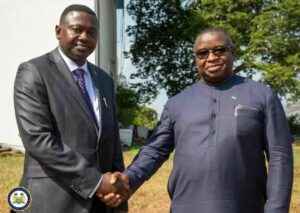Sheku Fantamadi Bangura Revives Sierra Leone Economy


Sheku Fantamadi Bangura, Sierra Leone’s Minister of Finance, stands out in the turbulent world of finance. His tenure has ushered in significant economic reforms, visionary policies, and a commitment to financial stability. This article explores Bangura’s life, career, and achievements, focusing on his role in transforming Sierra Leone’s economic landscape.
Early Life and Education
Sheku Fantamadi Bangura was born during a challenging economic period in Sierra Leone. From a young age, he showed a keen interest in economics and finance, driven by a desire to address economic disparities. His academic journey led him to prestigious institutions where he honed his finance and economic policy skills. This robust educational background prepared him to tackle Sierra Leone’s financial challenges.
Professional Beginnings
Before he was appointed Minister of Finance, Bangura gained extensive experience in various financial and economic roles. He worked with international organizations like the World Bank and the IMF, where he developed a reputation for analytical acumen and strategic thinking. His global perspective on economic issues was later applied to Sierra Leone’s unique context.
Ascension to Minister of Finance


President Bio Congratulates New Finance Minister Sheku Fantamadi Bangura
Sheku Fantamadi Bangura was appointed during a critical period as Sierra Leone emerged from the COVID-19 pandemic. The country’s economy was in tatters. With a mandate to revitalize finances, Bangura set to work with urgency and determination.
Economic Reforms and Policies
Under Bangura’s leadership, the Ministry of Finance implemented bold economic reforms. One of his first initiatives was introducing fiscal discipline measures to curb government expenditure and reduce the fiscal deficit. Bangura stabilized the country’s finances by enforcing strict budgetary controls and enhancing revenue collection.
Enhancing Revenue Generation
Bangura recognized the need for a robust revenue base for sustainable growth. He spearheaded efforts to modernize the tax system. Introducing electronic tax filing and payment systems improved efficiency and reduced corruption. Additionally, Bangura broadened the tax base by formalizing the informal sector, historically evading taxation.
Debt Management
Effective debt management was another cornerstone of Bangura’s strategy. Sierra Leone had accumulated substantial debt over the years. Bangura negotiated with international creditors to restructure and, in some cases, forgive portions of the debt. These negotiations freed up resources for development projects and reduced debt service obligations.
Public Financial Management
Bangura focused on strengthening public financial management systems. He introduced reforms to improve transparency and accountability in government spending. Implementing the Integrated Financial Management Information System (IFMIS) ensured real-time tracking of public funds, reducing opportunities for mismanagement and corruption. These measures improved public expenditure efficiency and boosted donor confidence, leading to increased foreign aid and investment.
Promoting Economic Diversification
Recognizing the risks of over-reliance on a few sectors, Bangura championed economic diversification to build resilience. He prioritized sectors like agriculture, tourism, and manufacturing, which had the potential to generate employment and stimulate economic activity.
Agriculture
Agriculture received significant attention under Bangura’s leadership. He introduced policies to support smallholder farmers, improve access to credit, and enhance agricultural productivity. Establishing cooperatives and providing subsidies for inputs like seeds and fertilizers boosted food production and reduced import dependence.
Tourism
Bangura saw tourism’s potential as a growth driver. He worked to improve infrastructure, streamline visa processes, and promote Sierra Leone as a safe tourist destination. These efforts increased tourist arrivals, contributing to foreign exchange earnings and job creation.
Social Impact and Poverty Reduction
Bangura’s policies aimed at macroeconomic stability and improving living standards. He recognized that inclusive growth was essential for sustainability. He implemented social safety net programs to support vulnerable populations, including cash transfers and subsidies for essential goods.
Challenges and Criticisms
Despite his achievements, Bangura’s tenure faced challenges and criticisms. The global economic environment, with fluctuating commodity prices and geopolitical uncertainties, posed significant hurdles. Critics argued that the reform pace was too slow and that more needed to be done to tackle corruption and improve governance.
Legacy and Future Prospects
As Sheku Fantamadi Bangura continues to steer Sierra Leone’s financial course, his legacy is already taking shape. His tenure has laid a solid foundation for economic stability and growth, positioning Sierra Leone on a path to prosperity. While challenges remain, Bangura’s vision and dedication offer hope for a brighter economic future.
Sheku Fantamadi Bangura’s journey from a passionate economics student to a leading figure in Sierra Leone’s financial sector is a testament to vision, determination, and effective leadership. His achievements in stabilizing the economy, enhancing revenue, managing debt, and promoting diversification have made him pivotal in Sierra Leone’s economic resurgence. As the country continues its development journey, Bangura’s contributions will remain a cornerstone of its financial and economic landscape.
Recent Posts
SLPPNA Convention 2025 Election Disputes Shake Leadership
Three SLPPNA chapter elections were annulled, raising allegations of manipulation by Chairman Pessima as he…
SLPP North America Leadership Twist
Explore the behind-the-scenes politics of SLPP North America as Chairman Pessima maneuvers for a second…
President Bio Expands Sierra Leone’s UNIDO Partnership in Key Sectors
Sierra Leone’s President Julius Maada Bio reinforces the nation's collaboration with UNIDO, aiming to drive…
First Lady Fatima Bio Honored at London Political Summit
Dr. Fatima Maada Bio, First Lady of Sierra Leone, was honored at the 9th Annual…
Bio Launches 5th Generation Justice Reform Strategy
New Brookfields Hotel, Freetown, Thursday, 12 September 2024 — Sierra Leone’s President, Dr. Julius Maada…
Sierra Leone and China Sign $50M SMART Project Agreement
Beijing, China, Tuesday, September 3, 2024. The Government of Sierra Leone and China National Technical…

